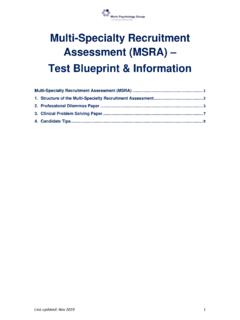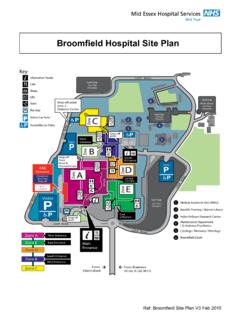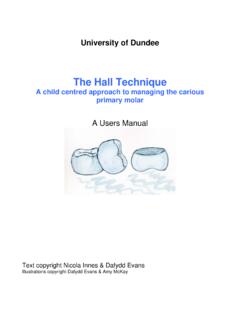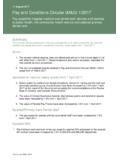Transcription of JOB DESCRIPTION ACADEMIC CLINICAL FELLOWSHIP IN …
1 JOB DESCRIPTION ACADEMIC CLINICAL FELLOWSHIP IN psychiatry core training CT1 / CT2 LEVEL September 2016 ACADEMIC CLINICAL Fellow ( psychiatry core training ) The post will be appointed at CT1 / CT2 level and provide funding for up to three years. The principal aim of the ACF scheme is to allow academically gifted CLINICAL trainees the opportunity for 25% protected research training alongside completion of core psychiatric training and to formulate and submit an externally funded Research training FELLOWSHIP (RTF) ( MRC, Wellcome Trust). It is anticipated that all successful ACFs completing RTFs would be in a strong position to compete for CLINICAL Lecturer posts following award of their higher research degree, as per the Integrated ACADEMIC training programme. This post carries an ACADEMIC training number - NTN(A) and will be part of the run-through East of England psychiatry training Programme.
2 The Cambridge psychiatry ACF programme The Department of psychiatry in Cambridge is particularly well placed to train ACADEMIC psychiatrists in research and teaching that can support the critically important goals of enhancing the practice and application of both type 1 (bench to bed-side) and type 2 (bed-side to health-service) translational research. We have strong links both NHS and ACADEMIC structures. The establishment of Cambridge University Health Partners (CUHP; the ACADEMIC health sciences centre for Cambridge) and recent changes in Cambridgeshire and Peterborough Foundation Trust (the local Mental Health Trust) will foster ever closer collaboration between the NHS and the University Department of psychiatry . The Department of psychiatry is a key partner (with Experimental Psychology) in the MRC and Wellcome Trust Behavioural & CLINICAL Neuroscience Institute.
3 The Department of psychiatry also has strong collaborative links with other groups, including the MRC Cognition and Brain unit, the University Department of Experimental Psychology, the Wolfson Brain Imaging Centre and the Institute of Public Health. core research posts in the department are supported by a variety of funding streams including HEFCE, the Medical Research Council, the Wellcome Trust and The Stanley Foundation. In addition, in recent years the department has gained substantial UK National Institute of Health Research funds including multimillion pound awards to establish Collaborations for Leadership in Applied Health Research and Care (CLAHRC). The department is also part of the University of Cambridge NIHR Biomedical Research Unit (BRU) specialising in dementia. The department is also responsible for the development, delivery and examination of psychiatry teaching in the CLINICAL School and members of the department have senior roles in postgraduate medical education under the auspices of Health Education England.
4 The Department has international expertise in several fields of psychiatry . The Head of Department is Professor Ed Bullmore, a widely respected expert in neuroimaging and neuroimmunology. Other internationally recognised authorities working in the department include Prof Peter Jones (epidemiology and psychosis), Prof Ian Goodyer (adolescent affective disorder), Prof Simon Baron-Cohen (autism), Prof Tony Holland (intellectual disability), Prof Barbara Sahakian (neuropsychology), Prof Paul Fletcher (cognitive neuroscience), Prof John O Brien (old age psychiatry and dementia research), Dr Graham Murray (neuroimaging), Dr Ulrich Muller (psychopharmacology), Dr Howard Ring (neuropsychiatry) and Dr Paul Wilkinson (Child and Adolescent psychiatry ). ACADEMIC training : The ACADEMIC training will be overseen by the Head of Department Prof Ed Bullmore, together with the ACF trainee s selected research Mentor and the ACADEMIC Lead in the Eastern Region Postgraduate School of psychiatry Dr Howard Ring.
5 The objectives of ACADEMIC training will be i) to complete a module of didactic research training focused on generic research skills ( research governance and ethics, data protection, statistical methods, experimental design); and ii) within an individual, trainee-centred programme, to formulate an original research protocol, undertake a feasibility study / generate pilot data, analyse experimental data, and write a research report to publication standard as part of the process of developing a training FELLOWSHIP application. To support this, the post holder will receive 25% protected research training time during their time as an ACF. The majority of this time will be provided in a block that is likely to be taken during the CT2 year. Fellows will be supported to select a mentor or supervisor from an approved list of senior academics and this supervisor will provide one-to-one tutorial style support for the Fellow's preparation of a Research training FELLOWSHIP application.
6 Fellows will be able to meet all key members of the Department and gain an overview of the research structure of the department and available research areas. They will decide upon a project and research supervisor appropriate to their career goal, areas of interest and abilities. The programme will then focus on the fellow's emerging research interests and ACADEMIC career plans with the development of a training FELLOWSHIP application. These objectives are intended to give Fellows a basic grounding in research methodology and an opportunity to develop a study, including completing pilot work, in an area of personal scientific interest, supporting the development of a strong Research training FELLOWSHIP application. Didactic training in generic research skills will be delivered through the Department and University educational programmes, including the Graduate School of Biological, Medical and Veterinary Sciences, which include numerous courses in generic research skills.
7 Fellows will also be able to access more specific research training and project support through the MRC/Wellcome Trust Behavioural and CLINICAL Neurosciences Institute and the MRC Cognition and Brain Sciences Unit. CLINICAL research studies are well supported by access to the Wellcome Trust CLINICAL Research Facility and the Wolfson Brain Imaging Centre. Fellows will also be encouraged to participate appropriately in a range of programmed educational activies including the teaching provided to first year PhD students through a weekly lecture series jointly organised by psychiatry , Experimental Psychology and the MRC Cognition and Brain Sciences unit, the weekly postgraduate lectures orgranised by CLINICAL and ACADEMIC psychiatry departments, weekly journal clubs and CLINICAL case presentations, Behavioural and CLINICAL Neurosciences Institute seminars, etc.
8 Fellows will select which programmes to attend at the various stages of their training after consultation with their supervisors. CLINICAL training : As well as an ACADEMIC mentor, each Fellow will have a CLINICAL supervisor who will be a Consultant Psychiatrist with experience in postgraduate CLINICAL training . core CLINICAL work will be 3 days/week, with day/week MRCP sych course attendance in term time (this protected time will be used for research outside term time). During their ACF, Fellows will rotate through suitable approved training posts in the established and well-respected Eastern Region psychiatry core training rotation. The CLINICAL attachments undertaken by the Fellows will provide relevant core and psychiatric sub-speciality skills to provide a suitable basis for individuals' research interests and their future inclusion in the specialist register.
9 MENTORING: Each Fellow will be mentored by the Head of Department (HoD) in their first year of FELLOWSHIP . By the end of this time the Fellow, with the HoD, will have identified a research supervisor with whom they will then carry out development and feasibility work and prepare a Research training FELLOWSHIP application. MILESTONES: Months 1-12: The main aims of this period will be a) to acquire substantial CLINICAL experience in core psychiatry areas; b) during the protected ACADEMIC time, to acquire generic, transferable research skills through a didactic course of training on research methodology and to explore possible research interests in depth with potential supervisors; c) to have been supported to have identified, by the end of the first year, the most appropriate research mentor. Fellows will also be expected to have entered for the Part 1 MRCP sych examinations.
10 Months 12-24: During this period the Fellow will spend the majority of their research time in the research laboratory of the research mentor preparing a training FELLOWSHIP proposal for a funding body. This will include: i) generation of pilot data/undertaking of feasibility study ii) acquisition of more focused training around the chosen project iii) writing of the FELLOWSHIP proposal with the mentor. Months 24-30: Fellows will use this period to gain further CLINICAL training while finalising their application / awaiting the results of the FELLOWSHIP application. They will by this time be expected to have completed the first part of the MRCP sych exam and to have entered for the second part. MONITORING: This will be conducted in joint ACADEMIC and CLINICAL appraisals by the HoD (or nominee) and the CLINICAL Tutor. In addition there will be at least fortnightly meetings with the research mentor once identified.


















